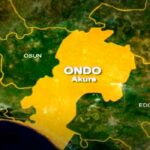
The Federal High Court, Abuja has granted the detained leader of the Indigenous People of Biafra, Nnamdi Kanu, permission to apply for an order of mandamus to compel the Department of State Service to allow him to have unfettered access to medical care.
In the suit marked FHC/ABJ/CS/ 2341/2022, Kanu through his legal team led by Mike Ozekhome and Ifeanyi Ejiofor, said he needed an independent medical examination to ascertain his health condition.
After hearing an ex-parte application filed by the IPOB leader, Justice Binta Nyako directed Kanu’s legal team to serve all the relevant processes on both the DSS and its Director General, who were cited as first and second respondents in the matter.
The IPOB leader said he would require from the DSS his admission records, medical and clinical notes, nursing notes, observation charts and documentation during treatment or stay-in-hospital, laboratory test results, pharmaceutical records, radiological scans, images and reports, blood transfusion records, physiotherapy and rehabilitative treatment records, clinical findings, as well as diagnosis and treatment prescribed records.
He pointed out that on October 21, 2021, Justice Nyako had ordered that he should be allowed access to three persons of his choice, including his medical doctors.
Specifically, he is praying to the court for an order, granting him leave to, “apply for judicial review in the form of an order of mandamus, compelling the respondents to allow the applicant unhindered access to his medical doctors to enable them to conduct an independent examination of his present deteriorating health condition, as earlier ordered by the Federal High Court, Abuja, Coram, Hon. Justice B.F.M. Nyako, on October 21, 2021; and as required by the express provisions of section 7 of the Anti-Torture Act, 2017.”
He argued that the respondents have repeatedly denied him access to medical doctors of his choice to independently examine him, contrary to the order of the court.
He also alleged that his health condition worsened following his detention where he was subjected to torture, inhuman treatment and degradation and that he suffered a mild cardiac arrest before he was “smuggled back into Nigeria.”
Kanu told the court, in an affidavit, that before his arrest in Kenya and extraordinary rendition back to Nigeria, he visited a specialist cardiologist every week for medical examination and treatment.
He added that even though he has been discharged by the appellate court and his further detention is prohibited, he is still being held in solitary confinement in the custody of the respondents, where he is exposed to daily mental and psychological torture and degradation of his person.





